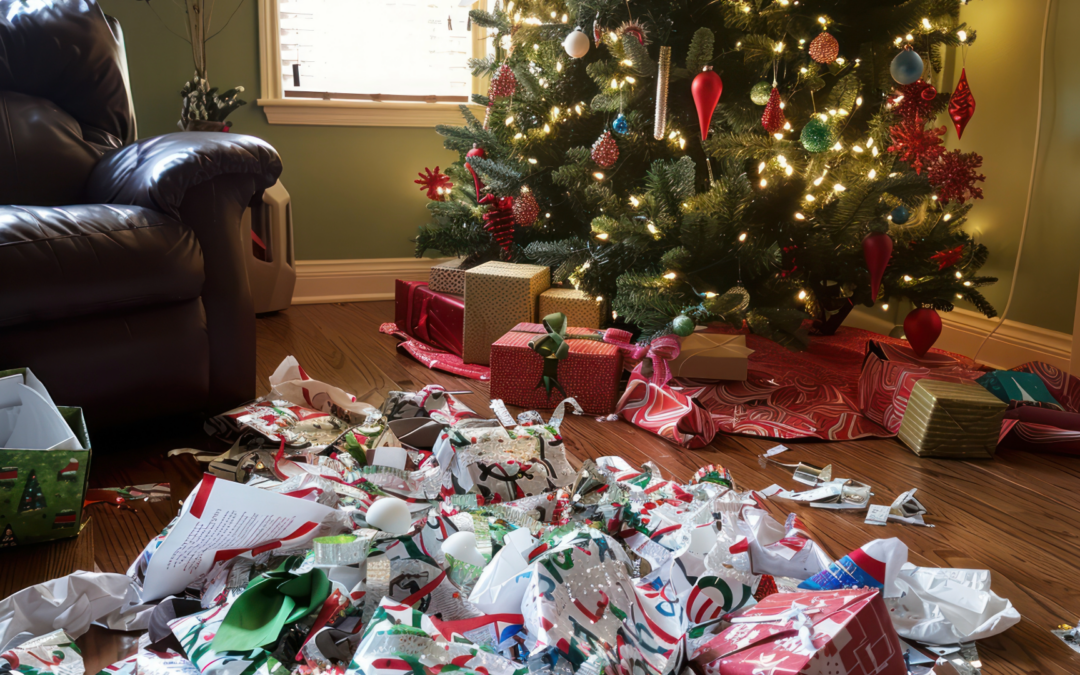The Glitter Fades, the Waste Remains
Once the festive lights are packed away and the last pavlova slice is gone, reality sets in. The aftermath of Christmas often includes overflowing recycling bins, maxed-out credit cards, and a lingering question—was it all worth it?
While the holidays are a time of joy, they also come with a heavy environmental and emotional cost. In New Zealand, household waste spikes significantly during the holiday season, with waste volumes increasing by around 30% between mid-December and early January, according to local councils. That’s thousands of tonnes of additional rubbish heading to landfills every year.
But it’s not just about the rubbish. It’s about the energy, resources, and mental toll that come with overconsumption. Let’s break it down.
1. The Environmental Impact of Holiday Excess in New Zealand
Wrapping Paper & Packaging Waste
Those beautifully wrapped gifts? They come at a cost. Every year, Kiwis throw away enough wrapping paper to circle the globe—twice. And here’s the kicker: much of that glossy, glittery paper isn’t recyclable.
Local councils, including Auckland Council, regularly remind residents that foil, plastic-coated, and glittery wrapping paper can’t be recycled. Instead, it ends up in landfills, contributing to New Zealand’s growing waste problem.
The Gift of… Landfill Overflow?
Think about all the gifts people didn’t really want or need. Whether it’s another novelty mug, a plastic gadget that breaks within weeks, or clothes that never get worn, a large percentage of holiday gifts end up unused. Research by the Sustainable Business Network (SBN) suggests that up to 20% of gifts are unwanted, with many ending up in second-hand shops—or worse, the bin.
Food Waste Frenzy
Kiwis love their festive feasts—ham, pavlova, fresh seafood, and barbecues galore. But sadly, much of this food goes to waste. According to Love Food Hate Waste NZ, each New Zealand households throw away an estimated $1,520 worth of food per year. That’s $3.2 billion of food wasted—and food waste spikes by around 30% during the holiday season.
That’s not just money down the drain; it’s also a huge waste of resources like water, energy, and transport that went into producing that food.
2. The Emotional Burnout of Overconsumption
It’s not just the planet that feels the strain—we do, too.
Financial Stress
The average Kiwi household spends around $624 on Christmas gifts, according to surveys conducted by Finder NZ. Add in costs for food, travel, and entertainment, and it’s no surprise that one in four New Zealanders experience financial stress during the festive season.
Post-holiday debt is a common reality, with many people relying on credit cards and buy-now-pay-later services like Afterpay—only to regret it when January rolls around.
Gift-Giving Pressure
There’s an unspoken pressure to find the “perfect” gift, which often leads to last-minute purchases and impulse buys. But here’s the truth: the stress of buying the right thing often outweighs the joy of giving it, especially when gifts aren’t as meaningful as intended.
Emotional Exhaustion
From endless shopping trips to hosting family gatherings, the holidays can be emotionally draining. The constant hustle, combined with the pressure to create “perfect” memories, often leaves people feeling more exhausted than fulfilled.
3. Rethinking Holiday Traditions: Is There a Better Way?
The good news? It doesn’t have to be this way. Embracing post-Christmas sustainability isn’t about being a Grinch—it’s about finding meaningful ways to celebrate without all the excess.
Mindful Gift-Giving
Quality Over Quantity: Focus on thoughtful, meaningful gifts rather than buying for the sake of it.
Experiences Over Stuff: Give the gift of experiences—tickets to a concert at Spark Arena, a scenic train ride on the TranzAlpine, or a voucher for a local adventure.
Support Local: Choose gifts from New Zealand artisans, eco-friendly brands, or second-hand shops. Supporting local businesses also boosts the Kiwi economy.
Eco-Friendly Wrapping Hacks
Reusable Options: Try fabric wraps (furoshiki), tea towels, or reusable gift bags.
Recyclable Materials: Use plain brown paper with natural twine—it’s chic, simple, and recyclable.
Repurpose: Old maps, newspapers, or even last year’s holiday cards make creative wrapping alternatives.
Sustainable Decorations
Ditch the Plastic: Opt for natural decorations like pinecones, driftwood, shells, or handmade crafts.
LED Lights: They use up to 80% less energy than traditional bulbs.
Reuse & Repurpose: Store decorations carefully to reuse them year after year.
Tackle Food Waste
Plan Ahead: Make a meal plan based on the number of guests to avoid over-purchasing.
Get Creative with Leftovers: Turn leftover ham into sandwiches, seafood into chowder, and pavlova into a trifle.
Compost: If you have food scraps, composting reduces landfill waste and helps enrich the soil. Check out Kaicycle or Compost Collective for local composting initiatives.
4. Post-Christmas Cleanup: What Can You Do Now?
Even if the damage is done this year, there’s still time to make a difference.
Declutter Responsibly
- Donate Unwanted Gifts: Instead of letting unused items collect dust, donate them to local charities like The Salvation Army, Red Cross, or community op shops.
- Recycle Smart: Check your local council’s website for recycling guidelines, especially for wrapping paper, electronics, and packaging materials.
- Regift with Care: Regifting isn’t taboo if done thoughtfully—just make sure it’s something the recipient will genuinely appreciate.
Reflect & Reset
Ask yourself:
- Which holiday traditions truly brought joy?
- What purchases felt unnecessary in hindsight?
- How can I make more sustainable choices next year?
Jot down your thoughts now, while it’s fresh in your mind. Future you will thank you when the next holiday season rolls around.
Final Thoughts: Was It Worth It?
When the tinsel settles and the credit card statements roll in, it’s natural to wonder if all the holiday hustle was really worth it. The good news? Every year is a chance to do better. By reflecting on our habits and making small changes, we can reduce waste, save money, and find more joy in simplicity.
So, was it worth it? Only you can answer that. But next Christmas, maybe—just maybe—we’ll find that less really is more.
Until next time,
Hi-Tech Packaging

